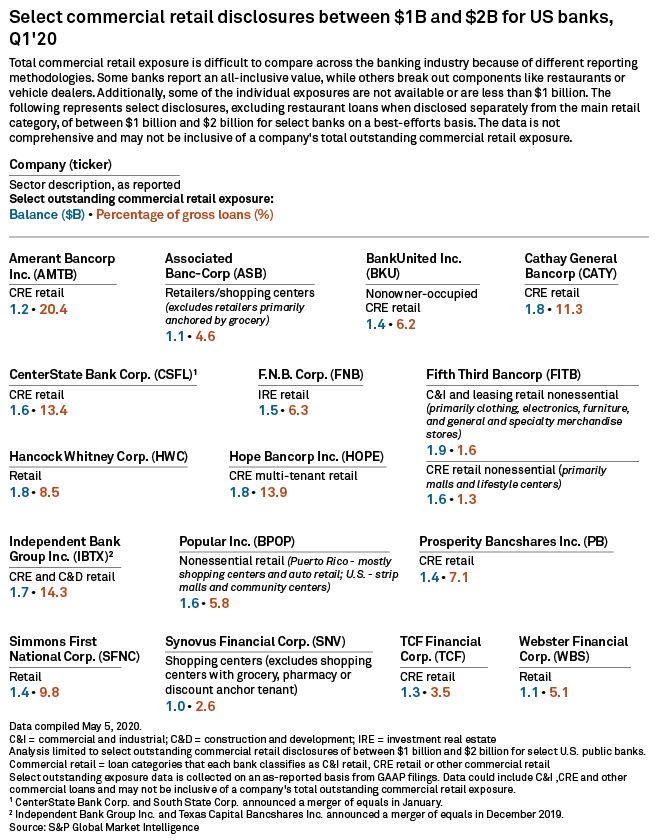U.S. banks continued to report exposure to the hard-hit retail industry in first-quarter filings.
The type and granularity of disclosures varied, with some banks reporting an all-inclusive commercial retail value and other banks reporting certain portions of their exposure.
Amerant Bancorp Inc., Independent Bank Group Inc. and Hope Bancorp Inc. disclosed significant proportional exposure to commercial retail in the first quarter, according to S&P Global Market Intelligence data.
Coral Gables, Fla.-based Amerant's outstanding commercial real estate retail loan balance was $1.2 billion as of March 31, constituting 20.4% of its gross loans. An April 28 investor presentation revealed that 36% of the portfolio's tenants had requested relief in the form of interest-only payments for 90 or 180 days or no payments for 90 days. Additionally, the bank detailed its CRE retail loans of more than $5 million: 31% went to the strip/convenience segment, 24% went to single tenant and the remainder went to the neighborhood center, community center and theme/festival center.
At McKinney, Texas-based Independent Bank Group, outstanding CRE and construction and development retail loans totaled $1.7 billion, representing 14.3% of gross loans. More than two-thirds of the exposure was for strip centers, and another 20% was devoted to the free-standing/single-tenant category. The portfolio consisted of 1,048 loans, 70 of which were in excess of $5 million.
Independent Bank Group announced a merger of equals with Dallas-based Texas Capital Bancshares Inc. in December 2019. Management did not provide a deal status update in its first-quarter earnings call.
Los Angeles-based Hope Bancorp's $1.8 billion in outstanding CRE multi-tenant retail loans accounted for 13.9% of its gross loans. The portfolio is largely comprised of strip mall properties, much of which are home to service-oriented businesses, and not shopping malls, according to an April 29 investor presentation.
Chairman, President and CEO Kevin Sung Kim said on the bank's earnings conference call that it began tightening underwriting standards in 2019, increasing the minimum debt coverage ratio in the retail space to 1.35x from 1.2x. The weighted average debt coverage ratio at origination is 1.71x for CRE multi-tenant retail loans made since 2019.

Miami Lakes, Fla.-based BankUnited Inc. reported $1.4 billion in outstanding nonowner-occupied CRE retail loans. The weighted average debt service coverage ratio was 1.76%. COO Thomas Cornish described the portfolio as having no significant exposure to big-box or large shopping malls, adding that approximately 60% of the exposure was allocated to "essential or moderately essential" businesses.
Puerto-Rico-based Popular Inc. had an outstanding loan balance of $1.6 billion for its nonessential retail segment, primarily consisting of shopping centers and auto retail in Puerto Rico and strip malls and community centers in the U.S.
"An important part of our shopping center portfolio in both regions are owned by long-term customers with financially strong principles that can withstand short-term disruptions in cash flow," Lidio Soriano, chief risk officer of the bank's corporate risk management group, said in an April 30 earnings conference call.
PNC Financial Services Group Inc. and Fifth Third Bancorp also reported nonessential retail exposure, with separate disclosures for CRE and other commercial, while Truist Financial Corp. disclosed $2.9 billion of exposure to "sensitive retail."

READ MORE:



